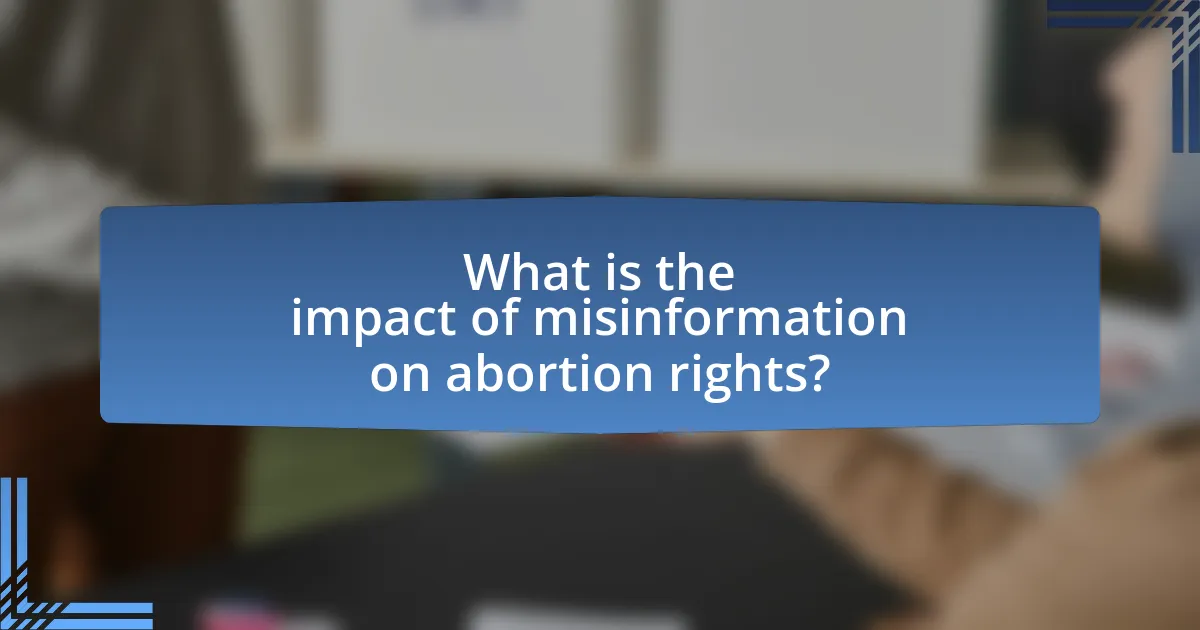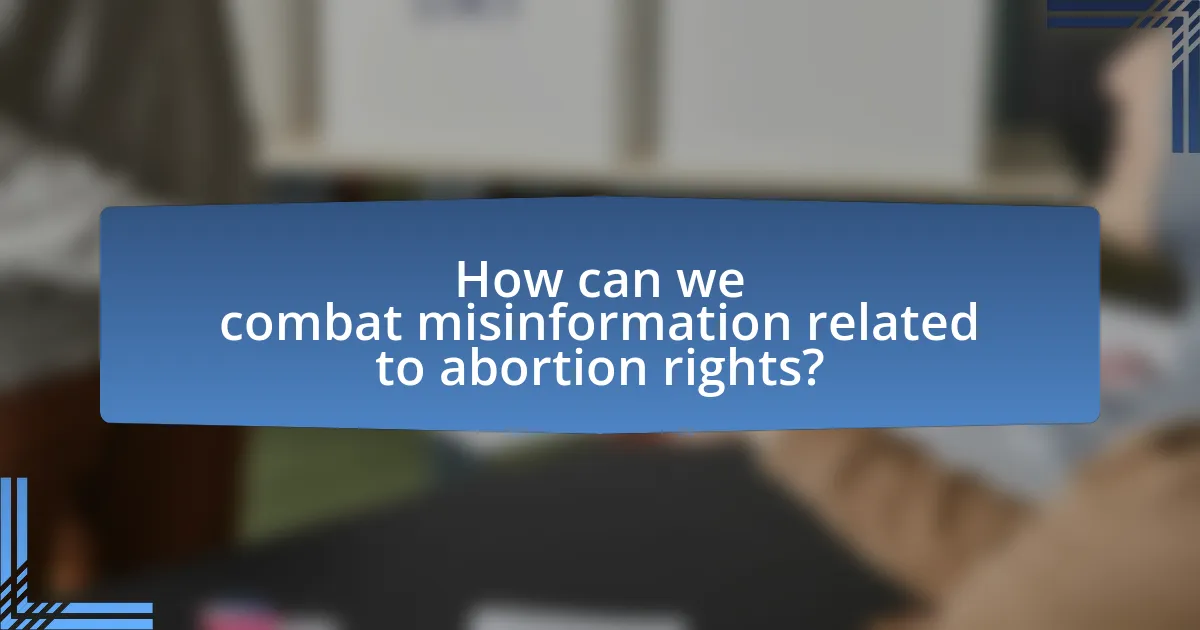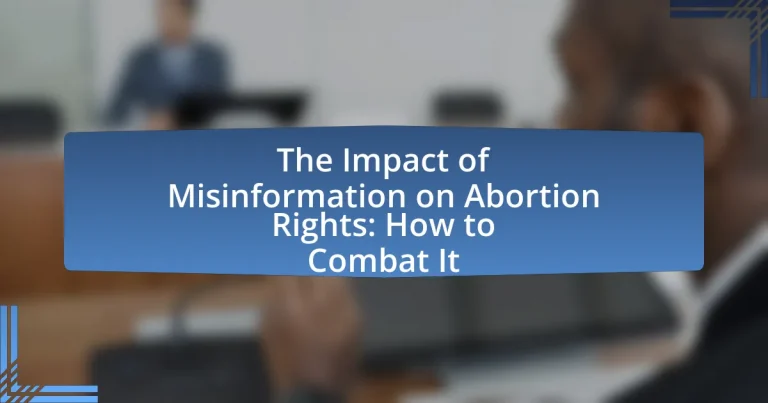The article examines the significant impact of misinformation on abortion rights, highlighting how false narratives shape public perception and influence policy decisions. It discusses the primary sources and mechanisms through which misinformation spreads, particularly on social media, and the consequences this has on legislative outcomes and individual beliefs. The article emphasizes the importance of addressing misinformation to protect reproductive rights and outlines effective strategies for combating it, including media literacy, fact-checking, and community engagement. Additionally, it identifies key organizations and resources that provide accurate information about abortion rights, underscoring the role of healthcare professionals in disseminating reliable data.

What is the impact of misinformation on abortion rights?
Misinformation significantly undermines abortion rights by shaping public perception and influencing policy decisions. For instance, false claims about the safety of abortion procedures can lead to increased stigma and fear, deterring individuals from seeking necessary healthcare. Research from the Guttmacher Institute indicates that misinformation can result in restrictive laws that limit access to abortion services, as seen in various states where misleading narratives have fueled legislative efforts to impose stricter regulations. Furthermore, studies show that misinformation can mobilize anti-abortion activists, creating a hostile environment for those seeking reproductive health services.
How does misinformation spread in the context of abortion rights?
Misinformation spreads in the context of abortion rights primarily through social media platforms, where false narratives and misleading information can rapidly gain traction. Studies indicate that misinformation can be amplified by algorithms that prioritize engagement over accuracy, leading to widespread dissemination of incorrect facts about abortion procedures, laws, and health implications. For instance, a 2020 study published in the journal “Health Affairs” found that false claims about abortion safety and legality were frequently shared, influencing public perception and policy discussions. This rapid spread of misinformation can create confusion, stigmatize individuals seeking abortions, and impact legislative decisions, ultimately undermining reproductive rights.
What are the primary sources of misinformation regarding abortion?
The primary sources of misinformation regarding abortion include social media platforms, political rhetoric, and biased medical information. Social media platforms often amplify false narratives and unverified claims, leading to widespread misconceptions about abortion procedures and safety. Political rhetoric frequently distorts facts to sway public opinion, with some politicians promoting exaggerated risks associated with abortion to garner support for restrictive laws. Additionally, biased medical information, often disseminated by anti-abortion organizations, misrepresents scientific data and undermines the credibility of legitimate medical sources. For instance, studies have shown that misinformation on social media can significantly influence public perception and policy decisions related to abortion rights.
How do social media platforms contribute to the spread of misinformation?
Social media platforms contribute to the spread of misinformation by enabling rapid dissemination of unverified content to large audiences. The algorithms used by these platforms often prioritize engagement over accuracy, leading to sensational or misleading information being shared widely. A study by the Massachusetts Institute of Technology found that false news stories are 70% more likely to be retweeted than true stories, highlighting the platforms’ role in amplifying misinformation. Additionally, the lack of stringent fact-checking mechanisms allows false narratives to proliferate, particularly on contentious issues like abortion rights, where misinformation can significantly impact public perception and policy.
What are the consequences of misinformation on public perception of abortion?
Misinformation significantly distorts public perception of abortion, leading to increased stigma and polarized opinions. For instance, false claims about the safety and psychological effects of abortion can create fear and misunderstanding among the public, influencing legislative decisions and personal beliefs. Research from the Guttmacher Institute indicates that misinformation contributes to a lack of support for reproductive rights, as individuals may base their views on inaccurate information rather than factual data. This distortion can result in reduced access to abortion services and hinder efforts to promote comprehensive reproductive health education.
How does misinformation affect legislative decisions regarding abortion rights?
Misinformation significantly influences legislative decisions regarding abortion rights by shaping public opinion and political agendas. When legislators rely on inaccurate data or misleading narratives, they may enact laws that do not reflect the actual needs or views of their constituents. For instance, studies have shown that misinformation about the safety of abortion procedures can lead to the introduction of restrictive laws, as seen in various states where false claims about health risks have been used to justify legislative actions. This creates a cycle where distorted information perpetuates further misinformation, ultimately affecting the legal landscape surrounding abortion rights.
What role does misinformation play in shaping individual beliefs about abortion?
Misinformation significantly influences individual beliefs about abortion by perpetuating false narratives and skewed statistics. For instance, studies indicate that exposure to misleading information can lead individuals to adopt more extreme views on abortion, often based on emotional rather than factual reasoning. Research published in the journal “Health Communication” shows that individuals who encounter misinformation are more likely to hold misconceptions about the safety and legality of abortion, which can shape their opinions and decisions. This distortion of facts creates a polarized environment where beliefs are formed based on inaccuracies rather than evidence, ultimately impacting public discourse and policy surrounding abortion rights.
Why is it important to address misinformation about abortion rights?
Addressing misinformation about abortion rights is crucial because it directly influences public perception and policy decisions. Misinformation can lead to stigma, fear, and confusion surrounding abortion, which may deter individuals from seeking necessary healthcare services. For instance, studies show that misinformation contributes to negative attitudes toward abortion, impacting legislative outcomes and access to reproductive health services. By correcting false narratives, advocates can promote informed discussions, support evidence-based policies, and ultimately protect individuals’ rights to make autonomous decisions regarding their reproductive health.
What are the potential risks of ignoring misinformation in this area?
Ignoring misinformation in the area of abortion rights can lead to significant risks, including the erosion of public trust in healthcare systems and the potential for harmful policy decisions. Misinformation can skew public perception, resulting in decreased access to safe abortion services and increased stigma surrounding reproductive health. For instance, studies have shown that misinformation can influence legislative outcomes, as seen in various states where false narratives have led to restrictive laws that limit reproductive rights. Additionally, ignoring misinformation can perpetuate health disparities, as marginalized communities may be disproportionately affected by false information, leading to poorer health outcomes and reduced autonomy over reproductive choices.
How can misinformation undermine reproductive health services?
Misinformation can undermine reproductive health services by creating confusion and fear among individuals seeking care. This confusion often leads to decreased utilization of essential services, such as contraception and safe abortion, as individuals may believe false claims about the risks or availability of these services. For instance, a study published in the journal “Contraception” found that misinformation about contraceptive methods significantly reduced their use, resulting in higher rates of unintended pregnancies. Additionally, misinformation can foster stigma and discrimination against those seeking reproductive health services, further deterring individuals from accessing necessary care.

How can we combat misinformation related to abortion rights?
To combat misinformation related to abortion rights, it is essential to promote accurate information through education and awareness campaigns. Research indicates that misinformation often spreads through social media, so utilizing platforms to share verified facts can significantly reduce its impact. For example, organizations like the Guttmacher Institute provide evidence-based data on abortion laws and health outcomes, which can be disseminated to counter false narratives. Additionally, engaging healthcare professionals to communicate factual information can help clarify misconceptions and provide reliable resources to the public.
What strategies are effective in countering misinformation?
Effective strategies for countering misinformation include promoting media literacy, fact-checking, and fostering open dialogue. Media literacy education equips individuals with the skills to critically evaluate information sources, reducing susceptibility to false claims. Research indicates that individuals who engage in media literacy programs are better at identifying misinformation (Hobbs, 2017). Fact-checking organizations play a crucial role by verifying claims and providing accurate information, which helps to dispel false narratives. A study by Lewandowsky et al. (2012) shows that timely fact-checking can significantly reduce the belief in misinformation. Additionally, fostering open dialogue encourages discussions that clarify misconceptions and allows for the sharing of accurate information, which can mitigate the spread of falsehoods.
How can fact-checking organizations play a role in combating misinformation?
Fact-checking organizations play a crucial role in combating misinformation by verifying claims and providing accurate information to the public. These organizations systematically investigate the validity of statements made in media, social platforms, and public discourse, particularly regarding sensitive topics like abortion rights. For instance, a study by the Pew Research Center found that fact-checking can significantly reduce the spread of false information, as individuals exposed to fact-checked content are less likely to share misinformation. By offering clear, evidence-based corrections, fact-checking organizations help to inform public opinion and promote informed decision-making, thereby mitigating the harmful effects of misinformation on critical issues such as abortion rights.
What educational initiatives can help inform the public about abortion rights?
Educational initiatives that can help inform the public about abortion rights include comprehensive sex education programs, community workshops, and online informational campaigns. Comprehensive sex education programs in schools provide accurate information about reproductive health, including abortion rights, which can reduce misinformation. Community workshops led by healthcare professionals and advocacy groups can facilitate open discussions, allowing individuals to ask questions and receive factual answers. Online informational campaigns utilizing social media platforms can reach a broader audience, disseminating accurate information and countering myths about abortion rights. These initiatives are supported by research indicating that informed communities are more likely to support reproductive rights and make educated decisions regarding their health.
How can individuals contribute to combating misinformation?
Individuals can contribute to combating misinformation by verifying information before sharing it. This involves checking the credibility of sources, cross-referencing facts with reputable organizations, and utilizing fact-checking websites such as Snopes or FactCheck.org. Research indicates that misinformation spreads rapidly on social media, with a study by Vosoughi, Roy, and Aral (2018) published in Science showing that false news stories are 70% more likely to be retweeted than true stories. By actively engaging in fact-checking and promoting accurate information, individuals can help reduce the spread of false narratives, particularly regarding sensitive topics like abortion rights.
What actions can individuals take to verify information before sharing?
Individuals can verify information before sharing by cross-referencing multiple reputable sources. This involves checking facts against established news organizations, academic publications, or official statements from credible institutions. For instance, a study by the Pew Research Center found that 64% of Americans believe that misinformation is a major problem, highlighting the importance of careful verification. Additionally, individuals can utilize fact-checking websites like Snopes or FactCheck.org, which specialize in debunking false claims. Engaging in these actions helps ensure that shared information is accurate and reliable, thereby combating the spread of misinformation, particularly regarding sensitive topics like abortion rights.
How can community engagement help in spreading accurate information?
Community engagement can significantly aid in spreading accurate information by fostering trust and collaboration among individuals and organizations. When communities actively participate in discussions and initiatives, they create a platform for sharing verified data and personal experiences, which enhances the credibility of the information being disseminated. For instance, community-led workshops and forums can serve as venues for experts to present factual information about abortion rights, countering prevalent misinformation. Research indicates that community engagement initiatives, such as those documented in the “Community Engagement in Health Promotion” study by the American Journal of Public Health, show that informed communities are better equipped to challenge false narratives and advocate for accurate information. This collaborative approach not only empowers individuals but also builds a collective understanding that is crucial in combating misinformation effectively.

What resources are available to combat misinformation on abortion rights?
Resources available to combat misinformation on abortion rights include fact-checking organizations, educational websites, and advocacy groups. Fact-checking organizations like Snopes and FactCheck.org provide verified information on claims related to abortion. Educational websites such as the Guttmacher Institute and the World Health Organization offer research-based data and analysis on abortion rights and health. Advocacy groups like Planned Parenthood and the Center for Reproductive Rights actively work to dispel myths and provide accurate information through campaigns and community outreach. These resources are essential for ensuring that the public has access to factual information regarding abortion rights.
What organizations focus on providing accurate information about abortion rights?
Organizations that focus on providing accurate information about abortion rights include the Guttmacher Institute, Planned Parenthood, and the Center for Reproductive Rights. The Guttmacher Institute conducts research and policy analysis on reproductive health issues, providing data-driven insights into abortion rights. Planned Parenthood offers educational resources and healthcare services, advocating for reproductive rights and access to safe abortion. The Center for Reproductive Rights engages in legal advocacy to protect and advance abortion rights globally, using litigation and policy advocacy to combat misinformation and promote accurate information.
How can these organizations assist individuals in understanding abortion issues?
Organizations can assist individuals in understanding abortion issues by providing accurate information, resources, and support. These organizations often offer educational materials that clarify the medical, legal, and social aspects of abortion, helping to dispel myths and misinformation. For instance, the Guttmacher Institute provides research and data on reproductive health, which can inform individuals about the implications of abortion policies and practices. Additionally, organizations like Planned Parenthood offer counseling services and workshops that empower individuals to make informed decisions regarding their reproductive health. By facilitating access to reliable information and expert guidance, these organizations play a crucial role in enhancing public understanding of abortion issues.
What online tools are available for fact-checking abortion-related claims?
Online tools available for fact-checking abortion-related claims include FactCheck.org, Snopes, and PolitiFact. These platforms evaluate the accuracy of claims by providing evidence-based analysis and sourcing credible information. For instance, FactCheck.org often reviews statements made by public figures regarding abortion, offering detailed explanations and references to studies or legal documents that clarify the context and accuracy of those claims. Snopes investigates viral claims and misinformation, while PolitiFact rates the truthfulness of statements on a scale, helping users discern factual information from misleading narratives.
What best practices can be adopted to ensure accurate information dissemination?
To ensure accurate information dissemination, organizations should implement fact-checking protocols, utilize credible sources, and engage in transparent communication. Fact-checking protocols help verify the accuracy of information before it is shared, reducing the spread of misinformation. Utilizing credible sources, such as peer-reviewed studies and expert opinions, ensures that the information is reliable and trustworthy. Engaging in transparent communication fosters trust with the audience, as it allows for open dialogue and clarification of any misconceptions. Research indicates that misinformation can significantly impact public perception and policy, particularly in sensitive areas like abortion rights, making these practices essential for effective communication.
How can media literacy programs enhance understanding of abortion rights?
Media literacy programs can enhance understanding of abortion rights by equipping individuals with critical thinking skills to analyze and evaluate information sources. These programs teach participants to discern factual content from misinformation, which is crucial in a landscape where abortion rights are often misrepresented. For instance, a study by the Pew Research Center found that individuals with higher media literacy are more likely to recognize biased reporting and misinformation, leading to a more informed public discourse on sensitive topics like abortion. By fostering these skills, media literacy programs empower individuals to engage in informed discussions and advocate effectively for their rights and the rights of others.
What role do healthcare professionals play in providing accurate information?
Healthcare professionals play a critical role in providing accurate information by serving as trusted sources of medical knowledge and guidance. They educate patients about abortion rights, procedures, and potential risks, ensuring that individuals make informed decisions based on evidence-based practices. Studies indicate that when healthcare professionals communicate effectively, misinformation is significantly reduced, leading to better health outcomes and increased public trust in medical advice. For instance, a survey by the American College of Obstetricians and Gynecologists found that 80% of patients prefer to receive information about abortion from their healthcare providers rather than from other sources, highlighting the importance of their role in disseminating accurate information.


